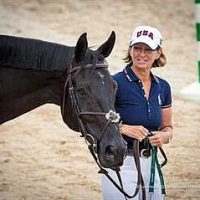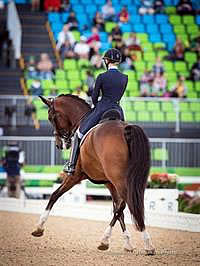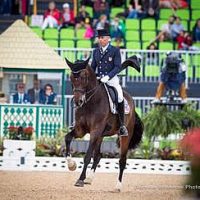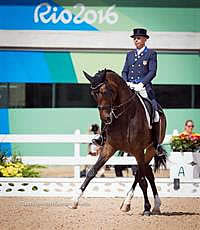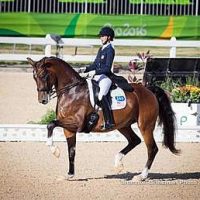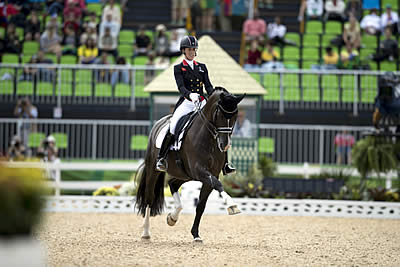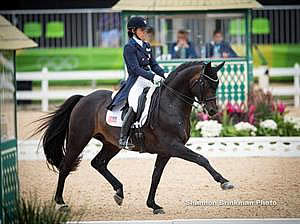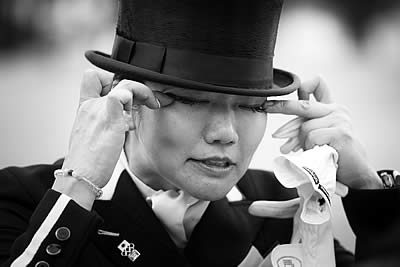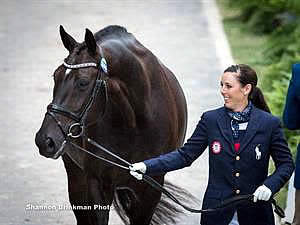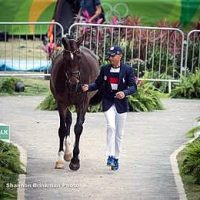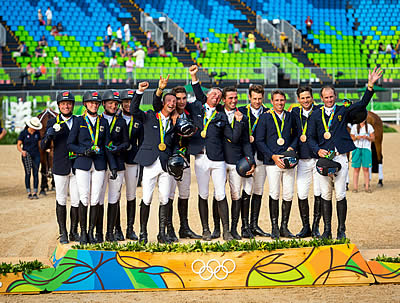(L to R) the silver medallists from Germany Michael Jung, Sandra Auffarth, Julia Krajewski and Ingrid Klimke; the French gold medallists Thibaut Vallette, Astier Nicolas, Karim Laghouag and Mathieu Lemoine; the bronze medallists from Australia, Christopher Burton, Shane Rose, Sam Griffiths and Stuart Tinney. (Arnd Bronkhorst/FEI)
Rio de Janeiro (BRA), 9 August 2016 – France claimed team gold and Germany’s Michael Jung took his second successive individual title as Olympic Eventing drew to a close at Deodoro Olympic Park in Rio de Janeiro (BRA).
Team
In a cliff-hanger of a contest it came down to the last four into the arena to decide the team result, and it was the defending champions from Germany who claimed silver with Australia slipping from the overnight lead to take the bronze.
The Australians were in charge as the day began, but with only a 4.5 point advantage over their New Zealand neighbours while the French were just 6.2 further adrift and the Germans were stalking the leading pack over 11 penalty points further behind. France was the only one of the leading sides to go into the closing phase with a fully intact four-member team, however, and in the end that proved the clincher.
The 12-fence track tested the turning skills of horses that took on one of the toughest Olympic Eventing cross-country tracks of all time Monday. But most were jumping fresh and well again and the pure quality of the four French horses was key to success.
Australia’s grip on the lead was severely undermined by a cricket score for their opener, Stuart Tinney, whose horse Pluto Mio kicked out four fences and also went over the time-allowed to collect a very expensive 17 faults. This dropped them into bronze medal spot, and left New Zealand out in front despite a single mistake from opener Jonelle Price with Faerie Dianimo. The French were already looking very comfortable after fabulous rounds from both Karim Laghouag with Entebbe and Thibaut Vallette riding Qing de Briot, but they began to look vulnerable when Mathieu Lemoine’s Bart L got tired towards the end of the track and left two fences on the floor for eight faults.
Enhanced
The Kiwis’ lead, meanwhile, was further enhanced by a great clear from Clarke Johnstone and Balmoral Sensation, while the Australians held their ground when Sam Griffiths returned on a zero score with Paulank Brockagh. Their chance of gold was gone, but they would hold onto bronze if the man who has led the individual standings throughout the competition so far, Christopher Burton, could bring Santano II home without incident.
As the final moments played out, however, the Germans loomed large on the horizon when Sandra Auffarth (Opgun Louvo), Ingrid Klimke (Bob) and Michael Jung (Sam) posted three superb clears to pile the pressure on the three teams ahead of them. The French didn’t flinch, and a foot-perfect run from their four-line rider, Astier Nicolas with Piaf de B’Neville, meant they posted a finishing score of 169.0 penalties.
It was still all to play for as legendary double Olympic gold medallist Mark Todd came in as anchorman for New Zealand, but a heart-wrenching 16 faults with Leonidas ll sent Kiwi chances crashing down. Their finishing score of 178.80 left them almost three penalty points behind the Germans and now only an Australian meltdown could keep them on the podium.
And the drama lasted to the very end. Australia’s Burton and Santano picked up eight faults to round up the Aussie finishing score to 175.30 for bronze, relegating New Zealand to fourth, 3.5 points adrift.
Record
Todd was tipped for the sixth Olympic medal of his career which would have been a New Zealand record. “That will be one of the biggest lows in my career. The whole week was a roller coaster ride. After yesterday’s cross country we were still in with a chance and then – boom – you’re out. I was hoping to go out on a high. Leonidas is such a good jumper but he got wound up when going into the arena. I thought he would settle but he got more and more rattled,” said the shattered 60-year-old Kiwi legend.
The French, however, were on a high. This is the first gold and only the second medal of the Rio 2016 Olympic Games for the country that has only won two previous team titles in Eventing – a bronze in Rome in 1960 and gold at Athens in 2004.
“This is fantastic,” a clearly thrilled Astier Nicolas said afterwards. “There was a lot of pressure going into this, and really I just had to do what I could for the team. But even though there was a lot of pressure, I didn’t let it bother me. I really enjoyed my round and I am very happy. It’s just fantastic. It is an immense pleasure to be part of this team that has won gold for France. It is something we have waited for a long time, and it’s amazing!”
Individual
Jung (34) matched the record set by New Zealand’s Mark Todd at Los Angeles (USA) in 1984 and Seoul (KOR) in 1988 when making it a back-to-back double of individual Olympic Eventing golds. And, also like Todd, he rode the same horse that carried him to both team and individual glory in London (GBR) four years ago – Sam.
The defence of his London 2012 title didn’t get off to the perfect start as he had to settle for fifth place after the opening dressage phase, but a sensational cross-country run with the 16-year-old Sam Monday moved him up into second behind overnight leaders, Australia’s Christopher Burton and Santano II.
Having contributed to his country’s team silver medal winning performance with a copybook showjumping performance, Jung moved into pole position and couldn’t be toppled. And in a nail-biting finale, it was French team gold medallist Nicolas Astier who took the silver with Piaf de B’Neville, while America’s Philip Dutton and Mighty Nice moved up from fourth to take the bronze.
Man to beat
Jung came to Rio as the man to beat, with not just team and individual gold from London 2012 on his career record but also the individual world title from Kentucky (USA) in 2010 and team gold at Normandy (FRA) in 2014 along with three consecutive double-European titles. He’s long been a phenomenon, and the result further confirms his supremacy as one of the most successful athletes in the history of this super-tough sport.
Burton had already dropped to third as the individual final action began with the top 25 jumping in reverse order of merit, and two fences down cost him a podium placing, allowing Dutton to move up the order in the closing stages. The 52-year-old American made just one mistake with the aptly-named Mighty Nice to post a final score of 51.80.
Frenchman Astier Nicolas was lying in silver medal spot having helped secure team gold for his country with another fabulous another fabulous ride on his 13-year-old gelding Piaf de B’Neville. In 11th after dressage, his cross-country clear Monday sent him rocketing up to third individually, and another fault-free effort Tuesday moved him up another place in the race for the ultimate prize. An uncharacteristically wild jump at the third fence added four jumping penalties and two time faults, but even though that moved their scoreline up to 48.00 they still held the lead as Jung returned to the arena.
Cooler
But they don’t come any cooler than the man from the Black Forest and he made it look like a walk in the park as he crossed the finish line having added no penalties to his first-day total of 40.90, leaving him 7.1 penalties clear of Nicolas, the biggest winning margin in Eventing since the Barcelona 1992 Olympics when Australia’s Matt Ryan and Kibah Tic Toc won by a margin of 11.2.
“It’s the second time to win with Sam and that makes it even more special. I couldn’t be more proud of him,” Jung said. “He is so strong; on the cross-country he can run every hill, jump every fence, but in showjumping he’s very nervous and it’s hard for him to concentrate. He jumped better in the second round than in the first. Yesterday it was difficult for me in the warm-up because of the people and the noise, but today the preparation was much nicer because it was quiet and he could settle.” And he added without hesitation when asked where he goes from here: “Well, Tokyo 2020 of course, and the Europeans and maybe the world title along the way!”
The final leaderboard showed Australia’s Sam Griffiths and Christopher Burton in fourth and fifth places followed by New Zealand’s Clarke Johnstone (Balmoral Sensation) and Mark Todd (Leonidas ll) in sixth and seventh while China’s Alex Hua Tian sent a ripple of excitement across China when slotting into eighth place. “I can’t believe it. I came here hoping to be in the top 20 – I never imagined this!” said the 26-year-old rider.
Quotes:
Phillip Dutton (USA) – individual bronze: “I wasn’t actually expecting medal today. I was pretty happy with fourth. But now I’m pretty ecstatic about third!”
Christopher Burton (AUS) – team bronze: “Santano is a young green horse and today he showed his greenness a little bit. But he’s been far and above our expectations of what we thought when we bought him. So we’re still very happy.”
Ingrid Klimke (GER) – team silver: “My own personal aim was to finish like I sat in dressage, because I was very pleased with the dressage and now with the jumping. Yesterday… I would lie if I said we celebrated with a few beers last night (after cross-country). But on the other hand I must say I think my horse is a hero because he did so many wonderful things. There was just this one moment that there was a mistake.”
Talking about being with other event riders: “It’s always a big hug – yesterday from the people who were disappointed. There were many of them, so we were a good group. We were saying, ‘It was bad luck today or whatever, but this was not our day.’ And others we congratulated because we saw that they did wonderful rounds. It’s just great to be together and have these special moments.”
Sam Griffiths (AUS) – team bronze: “To go clear in an Olympic stadium is always a great thrill. The team competition was so tight; I knew I needed to go clear. But, to be honest, I’m sitting on what I think is one of the best horses in the world (mare Paulank Brockagh). I just sort of have to tell her where to go and she did the rest for me! Winning medals is great because it means we can bring our sport to the wider public. Obviously winning Badminton is also fantastic, but to take a sport to a wider community is always great.”
Alex Hua Tian (CHN): “The Don (Don Geniro) was very special this week. He is only nine years old and very inexperienced. This was a great week for me, for equestrian sport and for China. The hard work starts now with raising funds for the next four years. It does not stop. I will go home and have young horses to qualify for their (young horse eventing) world championships (at Le Lion d’Angers, France). Other riders will think about Badminton or Burghley but for me it will be Tokyo.”
Astier Nicolas (FRA) – team gold and individual silver: “It’s been a long wait to bring team gold back to France and victory tastes good today. I was lucky my horse felt very good even if he was tired after the cross-country. In the first round today I knew I had to jump clear for us to win, and that’s why I was not so good in the second round – it was just bad riding! My horse (Piaf De B’Neville) has been bought by a good owner of mine who then built a syndicate for him, with family and friends, so it’s amazing to have an owner as a team-mate! We have only nice people around him and he is the horse of my life, a good friend for me and a very very nice person!”
Full results here:
https://www.rio2016.com/en/equestrian-eventing-team-jumping-final
https://www.rio2016.com/en/equestrian-standings-eq-eventing-individual
By Louise Parkes
Media Contacts:
Rio 2016:
Anja Krabbe
Venue Media Manager
anja.krabbe@rio2016.com
+55 (21) 97556 1218
FEI:
Shannon Gibbons
Manager Press Relations
shannon.gibbons@fei.org
+41 78 750 61 46
Ruth Grundy
Manager Press Relations
Email: ruth.grundy@fei.org
Tel: +41 787 506 145
Leanne Williams
Manager Press Relations
leanne.williams@fei.org
+41 79 314 24 38
